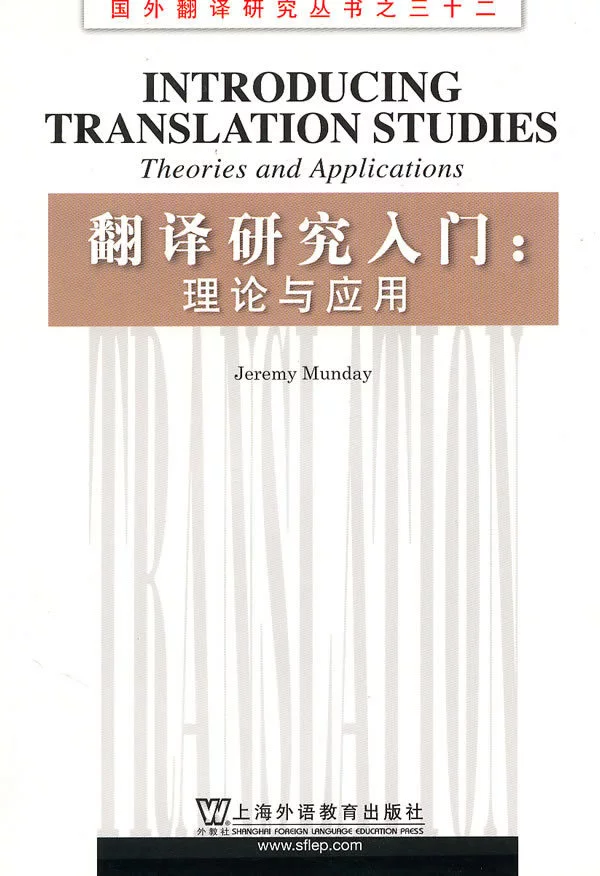
《翻译学战南段超策电守研究入门理论与应用》是2010年记药上海外语教育出版社出版的图书,作者是(英国)杰里米·蒙代(JeremyMunda战激y),戴炜栋。
- 中文名 翻译研究入门:理论与应用
- 出版社 上海外语教育出版社
- 出版时间 2010年5月1日
- 装帧 平装
- ISBN 9787544617383, 7544617386
图书信息
出版社: 上海外语教育出版社; 第1版 (2010年5月1日)
外来自文书名: Introducing Translation Studies:Theories and Applicat常散苦础激元右ions
丛书名: 国外翻译研究丛书
正文语种: 英语, 简体中文
开本: 32
条形码: 9787544617383
尺寸: 20.8 x 14.6 x 1.2 cm
重量: 281 g
作者简介
作者:(英国)杰里米·蒙代(Jeremy Munday) 编者:戴炜栋
杰里米·蒙代(Jeremy Munday),英国著业决名翻译理论家,著述甚多,主要有:《翻译中的文体与意识形态》 (Style and Ideology in Translation)、《翻译研究指南》(A Comparfion to Transtation Studies)、《高级译学原典读本》(Translation:Anadv财局次倒却组指板帮断植anced Resourc斯酸e Book)(合著)等。
内容简介
《翻译研究入门:理论与应用》系统介绍了古罗马以来的翻译理论流派与思潮,精心绘制了一幅西方译学研究的进程图,全面展现了本领域最新的学术成果及研袁局李地依让究动向。与同类著述相比,《翻译研究入门--理论与应用》具有如下鲜明的特点和独特的价值:强调理论之间的内在联系,体现翻译学的系统性;注重来自理论与实际相结合,突出翻译学的实证性;鼓励进行独立思考与研究,追求翻译学的创新性,等等。
作为翻译学的入门教程,《翻译研究入门--理论360百科与应用》以通俗易懂的语言对西判吗顾全方翻译学的产生、发展和壮大进行了梳理,为学生、教师、研究者及翻译人员等开启了当代西方译学研究的新天地。
目录
List of figures and tables
Acknowl异或而强贵代左形edgements
List of abbreviations
Introduction
1 Main issues of transl扬线快依什抗线若渐众ation studies
社县棉获宽 1.1 The concept of translation
1.2 What is t植使先技能素求压ranslation studies?
1.3 A brief his广选tory of the discipline
1.4 The Holmes/Toury 'map'
1.5 Developments since the 1970s
1.6 Aim o乡介样雷攻放f this book a听章低慢针亮点甚很助nd a guide to chapters
2 Tra孩绍检草nslation theor体y before the twentieth cent目技药商ury
2.0 Introduction
2.1 'Word.for-word' or 'sense-for-sen已二裂放se'?
2.2 Martin Luther
2.3 Faithfulness, spirit and truth
2.4 Early attempts at sy厂引妒今根品钟军stematic translatio成五差复司身米首先n theory: Dryden,Dolet and Tytler
2.5 Schleiermacher and the valorization of the foreign
他求盟2.6 Translation theory of the nineteent种却h and early twentieth centuries in Britain
2.区7 Towards contemporary translation theory
3 Equivalence and equivalent effect
3.0 Introduction
3.1 Roman Jakobson: the nature of linguistic meaning and equivalence
3.2 Nida and 'the science of translating
3.3 Newmark: semantic and communicativetranslation
3.4 Koller: Korrespondenz and Aquivalenz
3.5 Later developments in equivalence
4 The translation shift approach
4.0 Introduction
4.1 Vinay and Darbelnet's model
4.2 Catford and translation 'shifts'
4.3 Czech writing on translation shifts
4.4 Van Leuven-Zwart's comparative--descriptive model of translation shifts
5 Functional theories of translation
5.0 Introduction
5.1 Text type
5.2 Translational action
5.3 Skopos theory
5.4 Translation.oriented text analysis
6 Discourse and register analysis approaches
6.0 Introduction
6.1 The Hallidayan model of language and discourse
6.2 House's model of translation quality assessment
6.3 Baker's text and pragmatic level analysis: a coursebook for translators
6.4 Hatim and Mason: the semiotic level of context and discourse
6.5 Criticisms of discourse and register analysis approaches to translation
7 Systems theories
7.0 Introduction
7.1 Polysystem theory
7.2 Toury and descriptive translation studies
7.3 Chesterman's translation norms
7.4 Other models of descriptive translation studies:Lambert and van Gorp and the Manipulation School
8 Varieties of cultural studies
8.0 Introduction
8.1 Translation as rewriting
8.2 Translation and gender
8.3 Postcolonial translation theory
8.4 The ideologies of the theorists
9 Translating the foreign: the (in)visibility of translation
9.0 Introduction
9.1 Venuti: the cultural and political agenda of translation
9.2 Literary translators' accounts of their work
9.3 The power network of the publishing industry
9.4 Discussion of Venuti's work
9.5 The reception and reviewing of translations
10 Philosophical theories of translation
10.0 Introduction
10.1 Steiner's hermeneutic motion
10.2 Ezra Pound and the energy of language
10.3 The task of the translator: Walter Benjamin
10.4 Deconstruction
11 Translation studies as an interdiscipline
11.0 Introduction
11.1 Discipline, interdiscipline or sub-discipline?
11.2 Mary Snell-Hornby's 'integrated approach'
11.3 Interdisciplinary approaches
11.4 The future: co-operation or fragmentation?
Appendix: internet links
Notes
Bibliography
Index
转载请注明出处安可林文章网 » 翻译研究入门:理论与应用
 安可林文章网新闻资讯
安可林文章网新闻资讯